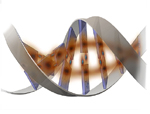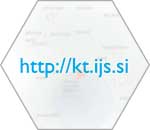SOFTWARE
|
CLUS Clus is a decision tree and rule induction system that implements the predictive clustering framework. This framework unifies unsupervised clustering and predictive modeling and allows for a natural extension to more complex prediction settings such as multi-task learning and multi-label classification. While most decision tree learners induce classification or regression trees, Clus generalizes this approach by learning trees that are interpreted as cluster hierarchies. We call such trees predictive clustering trees or PCTs. Depending on the learning task at hand, different goal criteria are to be optimized while creating the clusters, and different heuristics will be suitable to achieve this. Areas: Data mining and machine learning |

|
Project JOS - Linguistic Annotation of Slovene (Jezikoslovno označevanje
slovenskega jezika)
Morphosyntactic specifications, two annotated corpora, Web concordancer, and service for text markup. The first major and freely available (Creative Commons) set of resources for morphosyntactic annotation and lemmatisation of Slovene. Areas: Human language technologiesweb |

|
ECOGEN Soil Quality Index ESQI is a qualitative multi-attribute model, developed within the ECOGEN project, that calculates an index of soil quality relative to a selected standard soil condition ("medium" value of attributes). The model is implemented in a server-side script, and accessed through an interactive Web page. Areas: Decision support |

|
RSD
Relational Subgroup Discovery through 1.st order feature construction. The source code of the system, in Yap Prolog, is available for download, with samples and a user manual. Areas: Data mining and machine learning, Text and web mining |

|
SEGS SEGS (Search for Enriched Gene Sets) is a web tool for descriptive analysis of microarray data. The analysis is peformed by looking for descriptions of gene sets that are statistically significantly over- or under-expressed between different scenarios within the context of a genome-scale experiments (DNA microarray). Areas: Data mining and machine learning, Text and web mining |

|
MLC4.5 and MLJ4.8
Learn to combine classifiers with meta decision trees. Areas: Data mining and machine learning, Text and web mining |
|
|
LemmaGen A system for learning Ripple Down Rules specialized for automatic generation of lemmatizers. So far, LemmaGen was used to produce lemmatizers for 12 different languages. Areas: Human language technologies |

|
DEXi (DEX for Instruction) An educational computer program for qualitative decision modelling (developed within Slovenian Ro (Computer Literacy) Programme; 1999-2000) Areas: Decision support |
|
proDEX proDEX is a tool for qualitative multi-attribute modelling in basic and extended DEX methodology. Areas: Decision support |

|
GMOtrack GMOtrack is a program that supports traceability of genetically modified organisms. Given a table of GMOs (along with the probabilities of their presence and the genetic elements present in their genome) GMOtrack computes the optimal set of screening assays for a two-phase testing strategy. Areas: Decision support |
|
Lagrange/Lagramge
Lagrange and Lagramge are programs for inducing algebraic and ordinary differential equations from observational data. While Lagrange is completely data-driven approach to inducing equations, Lagramge allows for knowledge-driven induction, where user can tailor the space of candidate equation structures according to the background knowledge from the domain of interest. Areas: Data mining and machine learning |

|
CIPER - Constrained Inductive Polynomial Equation for Regression Regression methods aim at inducing model of numeric data. While most state-of-the-art machine learning methods for regression focus on inducing piecewise regression models (regression and model trees), we investigate the predictive performance of regression models based on polynomial equations. We present Ciper, an efficient method for inducing polynomial equations and empirically evaluate its predictive performance on standard regression tasks. Areas: Data mining and machine learning |
| Biomine SegMine e-ZISS LemmaGen ViperCharts | |||||||||||||||||||||||||||||||||||||||||||||||||||||||||||||||||||||||||||||||||||||||||||||||||||




